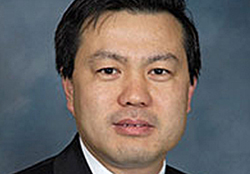
|
Kai Fu, M.D., Ph.D.
|
New ways to attack an aggressive and incurable type of lymphoma will be studied at UNMC with the help of a $300,000 grant from the Lymphoma Research Foundation (LRF).
Kai Fu, M.D., Ph.D., associate professor of pathology and microbiology, has received the grant — called the 2009 Millennium Pharmaceuticals, Inc./Lymphoma Research Foundation Clinical Investigator Career Development Award — to support his mantle cell lymphoma research.
This substantial investment by the Lymphoma Research Foundation is indicative of the group’s high esteem for Dr. Fu’s work, said Tom Rosenquist, Ph.D., vice chancellor for research at UNMC.
“I know that, with his innovative research approach and high level of energy, the investment will pay dividends in new, improved therapy for patients with mantle cell lymphoma,” he said.
More about the award
The three-year Clinical Investigator Career Development Award is designed to fund training of clinicians who will participate in developing new therapeutics and diagnostic tools for lymphoma.
The focus of the training is to prepare clinicians to design and administer clinical studies in lymphoma and to take on the primary responsibilities for clinical trial design, protocol writing, Institutional Review Board (IRB) submission, and publication.
Dr. Fu will pursue a career development plan with the guidance of his mentor, Wing (John) Chan, M.D., Amelia and Austin Vickery Professor of Pathology and co-director of the UNMC Center for Lymphoma and Leukemia Research.
“Dr. Fu has been highly productive in lymphoma research and I am glad that his potential as a physician-scientist is recognized by the LRF with a career development award,” Dr. Chan said. “We are grateful for this award that will provide essential supports during his transition to be an independent investigator.”
|
|
Lymphoma — the most common type of blood cancer — is broadly categorized into Hodgkin’s lymphoma (HL) and non-Hodgkin’s lymphoma (NHL). According to the World Health Organization, there are six types of HL and more than 61 types of NHL.
Mantle cell lymphoma is a rare B-cell NHL that is very aggressive. It accounts for 6 percent of all new diagnoses of NHL — or about 3,000 new cases per year in the United States.
The disease:
- Typically affects men older than 60;
- Frequently is diagnosed in Stage IV;
- Often is present in lymph nodes above and below the diaphragm; and
- In most cases involves the gastrointestinal tract and bone marrow.
It is characterized by over expression of the gene called cyclin D1 due to a chromosomal translocation.
A subset of mantle cell lymphoma also shows higher levels of a group of small RNA molecules, called miR-17~92.
About the foundation
The Lymphoma Research Foundation (LRF) is the nation’s largest voluntary health organization devoted exclusively to funding lymphoma research and providing patients and health care professionals with critical information on the disease. LRF’s mission is to eradicate lymphoma and serve those touched by this disease.
As of June 30, 2008, LRF had funded more than $37 million in lymphoma-specific research. The foundation is the world’s largest private funder of mantle cell lymphoma research.
|
|
Dr. Fu and his colleagues have found that this higher expression correlates directly with poorer patient survival. These findings indicate that higher miR-17~92 expression induces abnormal activation of a pathway in tumor cells that leads to increased resistance to standard chemotherapy.
This recent award will help Dr. Fu conduct a pre-clinical study to determine whether suppression of miR-17~92 will improve the effect of chemotherapy. His study may lead to a novel approach to treat MCL patients.
“Dr. Fu’s elegant proposal explores a new avenue for understanding MCL and identifying potential therapeutic targets,” said Michael Williams, M.D., director of the University of Virginia’s Hematologic Malignancy Program and chairman of the LRF’s Mantle Cell Consortium, of which Dr. Fu also is a member. “We are delighted that Dr. Fu has chosen MCL as the focus of his Clinical Career Development Project.”
